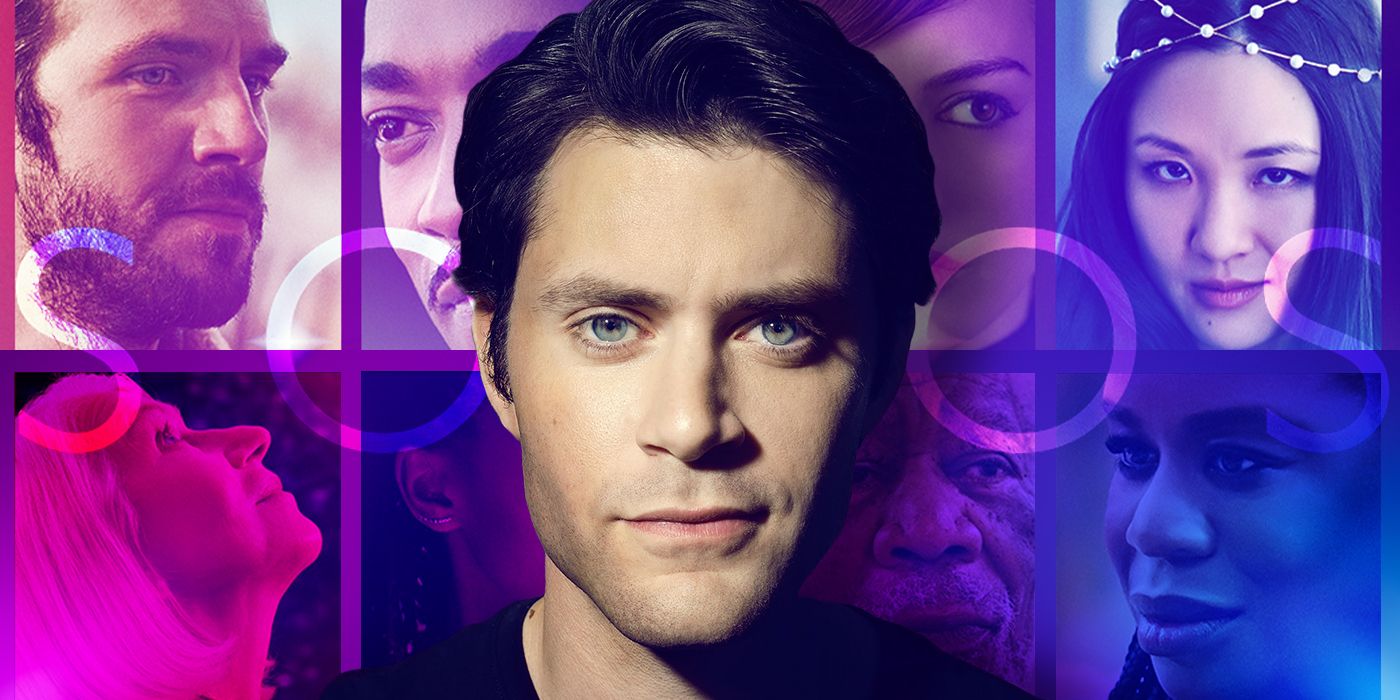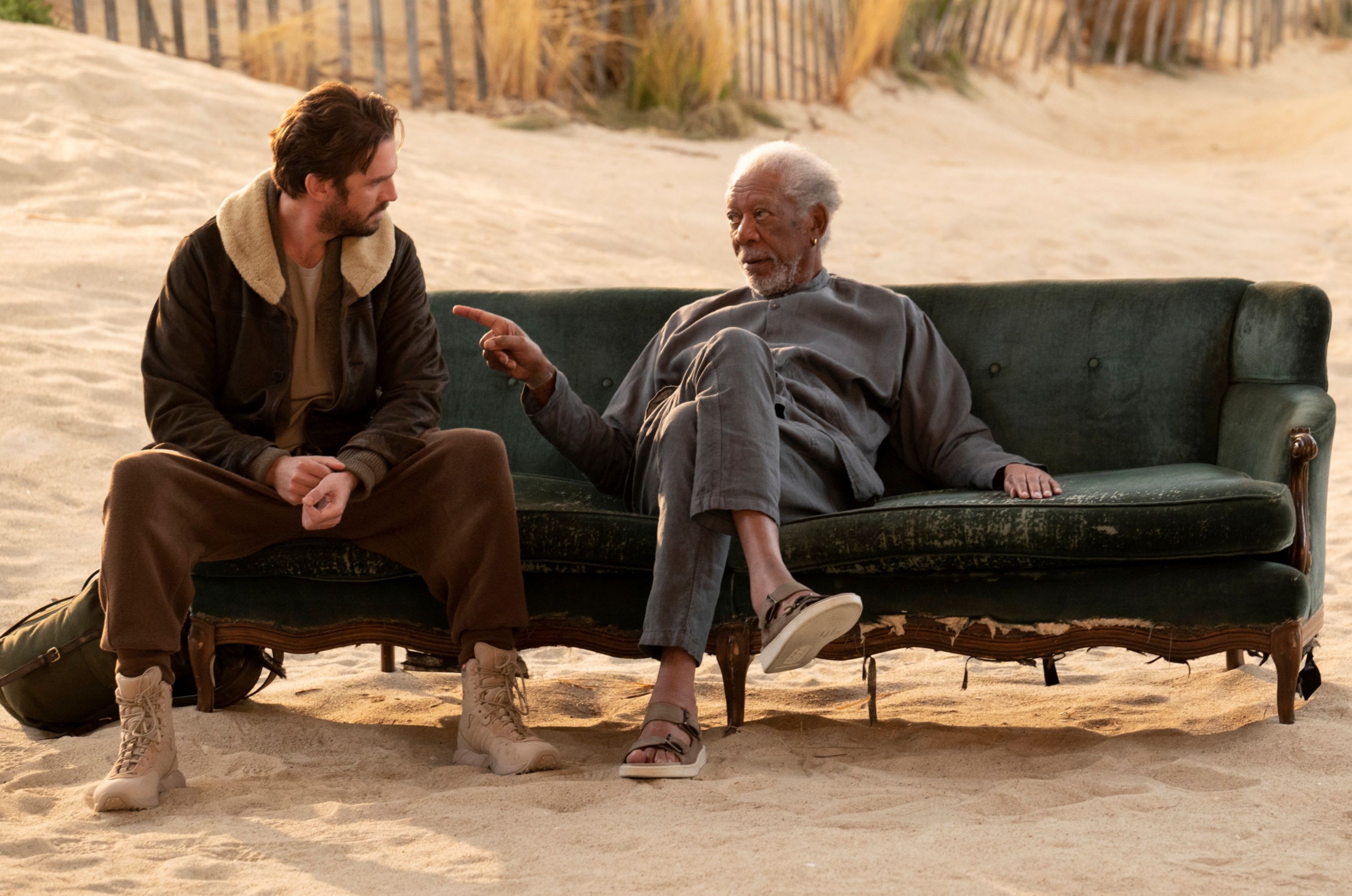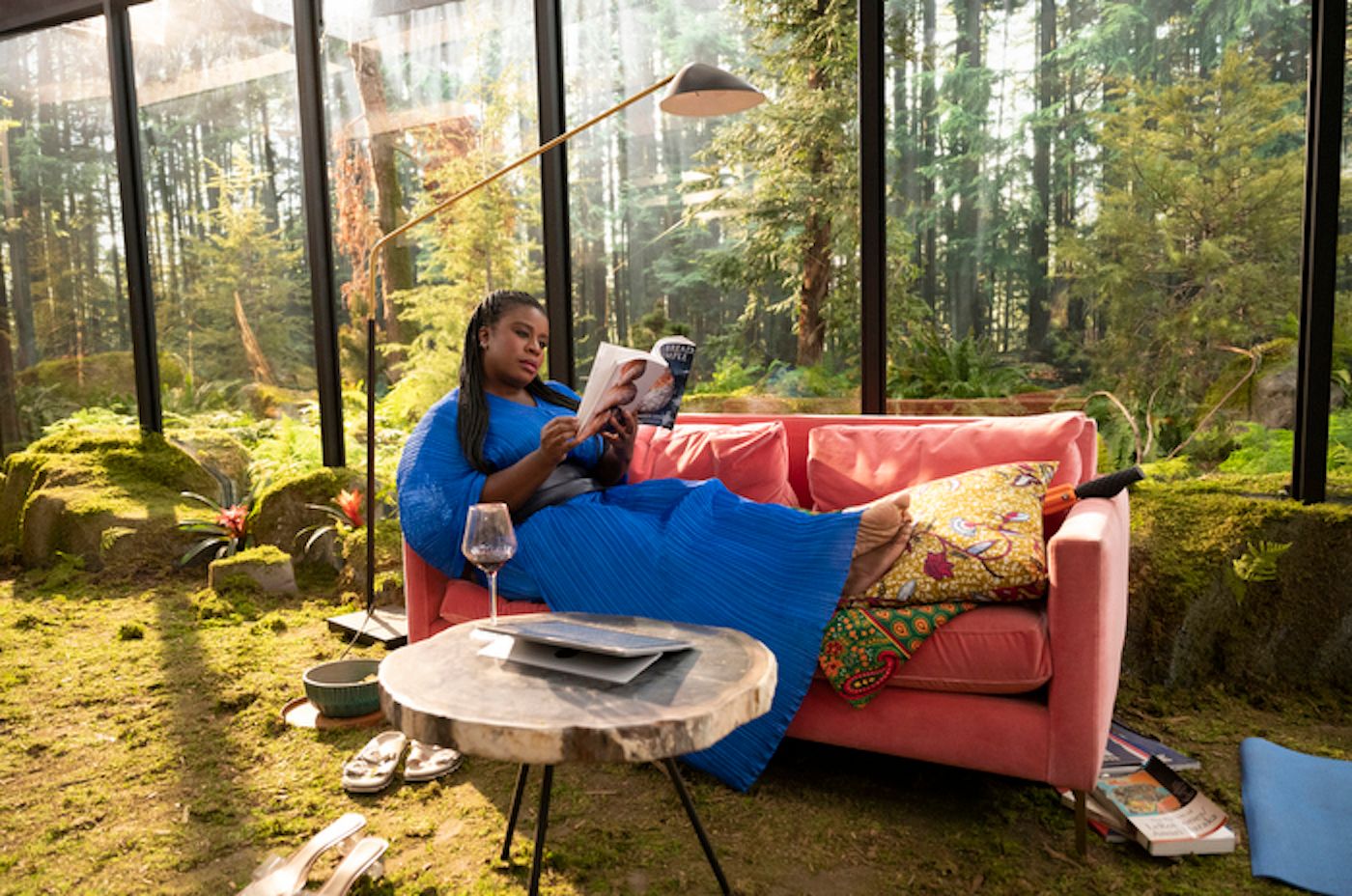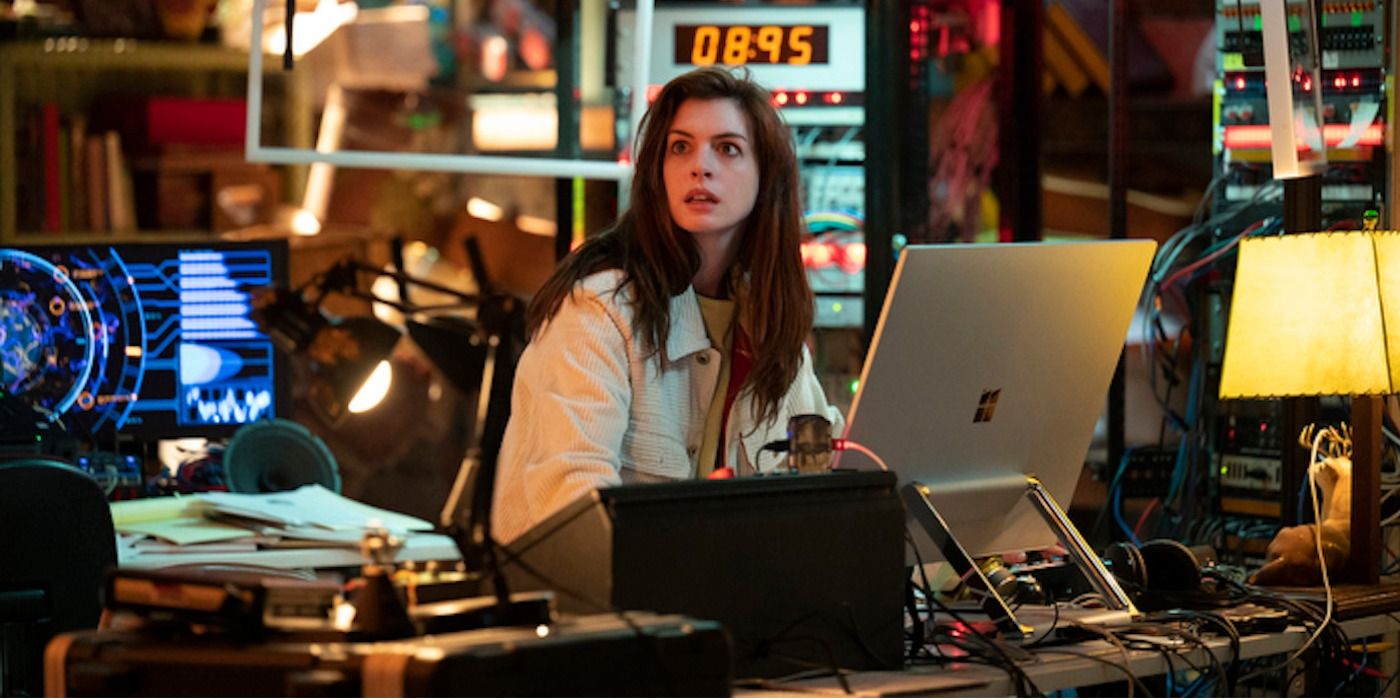From creator David Weil, the seven-part Amazon Prime Video original anthology series Solos is an exploration of what it means to be human and all of the emotions that come with that, spanning across the present and future. Human connection can and does take many forms and often intertwines with technology in different ways, whether through time travel, A.I. bots, smart homes, fertility treatments or memory transplants. The series stars Uzo Aduba, Nicole Beharie, Morgan Freeman, Anne Hathaway, Anthony Mackie, Helen Mirren, Dan Stevens and Constance Wu.
During a virtual junket to discuss the new series, Collider got the opportunity to chat 1-on-1 with executive producer Weil about how Solos evolved during the pandemic, working with such an A-list cast, designing the mysteries and reveals for each episode, and the biggest challenges of pulling this off. He also talked about Season 2 of his other Amazon series Hunters, and how the cast has inspired new ideas.
Collider: This could not be more different from Hunters. How did Solos come about?
DAVID WEIL: I wanted to create a series that returned me to how I first fell in love with stories. And the way I really fell in love with stories was through the best storytellers that I knew – people in my family, my grandmother, my brother. My brother would tell me ghost stories when we were camping as kids, or my grandmother would sit me at the kitchen table with a bowl of chicken soup and tell me stories about her experiences during the war, which inspired Hunters. I love that intimacy. I love one storyteller in a single room telling this really beautiful or harrowing tale. And so, I’ve always wanted to do a series like that. I don’t know if that’s always top on a network’s priority where they’re going, “Oh, my God, we’ve gotta do a seven-episode monologue series.” But after the past year that we’ve all been living through, I wrote this last May, at the height of lockdown and the pandemic, and we were all isolated. There was so much loneliness and solitude and pain and darkness and fear. This piece, for me, was a source of light. It was almost an exploration of connection and a catharsis, in that I was creating these characters who also were yearning for human connection, who also were yearning to be seen and heard, who had been overlooked or isolated in their lives, in certain ways. The initial desire was accelerated the past year, where I said, “Maybe this is the time for a show like this.” I wrote the first two episodes. I wrote “Tom” and I wrote “Peg,” and I sent them to Amazon and they were very, very excited and we went forward with it.
It seems like you wrote this at a time when production shut down and everybody thought it was going to be a couple of weeks, and then people wondered whether production would ever happen again. Did you have a period of time there where you wondered if this could ever actually be shot?
WEIL: Definitely. I was running two writers’ rooms, and then we shut them down and went virtual. We pushed production on some other shows because they were too big and we didn’t know when we’d be open again. But this show, uniquely because it’s one actor, was one of the safest productions that we could have shot and that was exciting. It was like, “Maybe this monologue series can live in this moment because we can do this incredibly safely. We can ensure that only the sole after on set is the one without the PPE and the mask.” That was also very exciting to Amazon, that we could continue to create and put out new art and a new series, but to produce something under the very strict guidelines that Amazon and the CDC had.
What’s it like to do a show with such an A-list cast, but have so few of them actually work with each other? Was it a bit of a bummer, in that sense?
WEIL: It was so bizarre. I did a little panel with the actors on Zoom, and it was so wonderful seeing Anthony [Mackie] meet Helen Mirren, and Uzo [Aduba] speak to Constance Wu. They were so excited to be a part of something that the other was in because they’re all such fans of each other. And Helen and Morgan [Freeman] are good friends. It was almost like a family reunion of a family that has never met. It was a joy and a dream cast. They’re also collaborative and wonderful. But really, the feeling of excitement was being on set with Anne Hathaway and her saying, “Is that Helen Mirren’s space pod?” And Helen saying, “Is that Morgan Freeman’s beach?” And Dan Stevens being like, “Is that Constance Wu’s waiting room?” There was such a joy and thrills for them, which made me incredibly thrilled.
These episodes have twists and reveals in them that are sometimes shocking and surprising. How did that aspect of the series evolve? Was that something that you always knew you wanted to do, or did that come up as you were developing the stories?
WEIL: It was always part of the design, in that I knew that, if we were gonna have one actor in one environment for 20 to 30 minutes, I needed to really ensure that an audience was leaning in and participating. The best way to do that was with mysteries, with reveals, and with a bit of vagueness at the beginning. We don’t really know what’s going on at the opening of each episode, and then we slowly begin to uncover it. I approached the writing of each piece, and I know the other writers did as well, just as you would a feature film, or a series of television. At the end of each episode of television, you would have a great cliffhanger or plot twist, but in a condensed 20 to 30 minute format, at the end of every three pages, you need a little bit of a twist or reveal to keep an audience engaged.
Was there anything that you were particularly worried about being able to pull off, or you weren’t sure until you had a great actor that could pull it off?
WEIL: That’s such a great question. I really believed in the material. I really did believe in the scripts I wrote and in the scripts that our other three wonderful writers, Stacy [Osei-Kuffour and Tori [Sampson] and Bekka Bowling, wrote, so I knew we had something special just textually. I think our actors brought it to a whole new level. On any show I do, if I’m not terrified, it’s not a show worth doing. Only the hardest of shows to make are the ones that are most exciting, fulfilling, and innovative to me. So, I always have that great fear, but I think the fear is a necessary ingredient. In terms of pulling it off, the biggest challenge was just that we only had three or four days to shoot each episode, which to get through 30 pages of material is unheard of. That was certainly a feeling of, “Man, how are we gonna do this?” But we did, and it’s really in large part to our cinematographer, William Rexer, our amazing filmmakers, and our cast, most of all.
Did you have the same process approach to each one of these episodes? Did you start with a character or a theme or a twist and write around that, or was it more fluid than that?
WEIL: For the episodes that I wrote, with “Peg,” I started with her character. With “Tom,” I started with the concept. With “Leah,” it was It was a bit of both. Each of these, there are future sci-fi what-ifs, like what if you could build a clone that could take over for you once you pass? What if there was a way to regenerate memory in supposedly an Alzheimer’s patient? So, for the “Stuart” episode, in particular, my grandmother had suffered from Alzheimer’s for many years, and then passed away from it. I always was dreaming about telling a story about, what if she gained her memory one day? What would that be like, with the cascade of memories and feelings and thoughts coming back to her? That became the “Stuart” episode. The “Peg” episode was really inspired by my mom and by my grandmother, and by all people who feel unseen in the world, and have so many symphonies of emotions and stories within themselves that they just never get to share. Each one originated either with a different theme or really just a different emotion. I wrote this in May of last year, and we were all reflecting so deeply on ourselves, and we were all attuned emotionally to what was happening, so it was really about what emotion I wanted to conjure in each episode.
For the “Tom” episode, what kind of co-star was Anthony Mackie, when it comes to him having to share scenes with Anthony Mackie?
WEIL: I’ve been wanting to work with Anthony Mackie forever. I’m the biggest fan. His charisma and his well of talent and emotional life is so deep. I saw Anthony on stage in A Behanding in Spokane and I’ve been a fan of his ever since. Anthony is a fine actor. When you watch “Tom,” he could do that every take. He could reach those emotional depths and every take, there were tears. He could access it every time. I’ve never seen anything like it. He’s such a generous collaborator. He’s such a brilliant actor, but he’s so generous, in that he’ll offer me so many different options, so that in the edit, we had the variety. Anthony and I knew what the piece would be, but he gave so many different levels, so that we could really graduate the performance in the edit, as we saw fit. To have a collaborator like that, who almost is a filmmaker as well, was a gift. The best anecdote I could give on Anthony being his own co-star is that what was so Herculean about it was watching him sitting on the couch as Tom and performing so deeply and crying and emoting, and at the very same time, looking across the sofa across from him and trying to intuit how he was gonna react and respond as Edward. He was basically doing a one man duet, the whole time, playing two instruments at once. I don’t know how he did it. He has this otherworldly talent that is just so magnetic to watch.
You also had Anne Hathaway sharing scenes with more than one version of herself.
WEIL: With Anne Hathaway, in particular, her finding the specificity of each of the three Leahs was magnificent. The challenge with“Leah” is that it’s not playing three different characters. It’s really playing the same character, at three different stages. It was a Venn diagram of, what are the similar ticks that the character would have, but then also, how are they different, in other ways?
Hunters is a show that really snuck up on everybody. People didn’t really know what to expect from it and I think most people were shocked by the end of the season. How will Season 2 compare? How did you even figure out where to go from there?
WEIL: After Hunters and now doing a monologue series, you always know to expect the unexpected. Hunters is the same. There are gonna be so many twists and turns, and so many rug pulls and reversals. People you thought were heroes become villains, and villains, well, they usually stay villains in our show. But we get even deeper with many of our characters. It will really be an unexpected ride. I’m so bullish and excited about where we go in Season 2 and I’m excited for you to see it.
I know that you had talked about how you had thought about five seasons of material. How similar is Season 2 to what you thought Season 2 would be?
WEIL: It’s both very similar and incredibly different. It certainly shares some of the core DNA of what I imagined Season 2 to be, but it borrows from what I thought Season 3 would be. There are a few similarities, but then there’s so much new invention, and that really comes from just being so inspired by our wonderful cast. When I first wrote Hunters, and then had the idea for what future seasons would be, it was before we even cast the piece. I’m just so inspired by our wonderful actors. Their ingenuity and their talent inspired really interesting and strange new ideas for Season 2.
Now that you’ve done Hunters and Solos, are there things you’ve learned about yourself as a writer, as a storyteller, and now as a director, that you feel will continue to influence what you’re doing?
WEIL: Absolutely. Every project I do, I learn more. Every wonderful actor or craftsperson or director I work with that, I learn a great deal more. Now that I’ve directed on Solos, I feel like I learned so much about being a writer, most of all, to be so much less precious at times with the text, to allow the visual and emotional storytelling to take center stage and sometimes to allow the text to be the springboard off of which it can be realized, but not have to be so sacrosanct about the textual material.
On TV shows, you don’t normally get to pick the episodes that you end up directing, but did you get to actually pick the specific episodes that you directed?
WEIL: I did. In part, because I’m such a fan of Tori and I’m such a fan of Bekka, I was like, “Please let me direct your episodes.” And then, I really did want to direct something that I had written because I wanted that experience as well, to really be able to take something from blank page to final frame. I wanted variety in the pieces that I directed. I also wanted each piece to have the defining filmmaker for that piece. That’s why I think Sam Taylor-Johnson was so perfect for “Peg” and for “Stuart,” Zach [Braff] for “Leah,” and Tiffany [Johnson] for “Nera.” I definitely did have my picks, so I called in a favor on that one.
Solos is available to stream at Amazon Prime Video.




